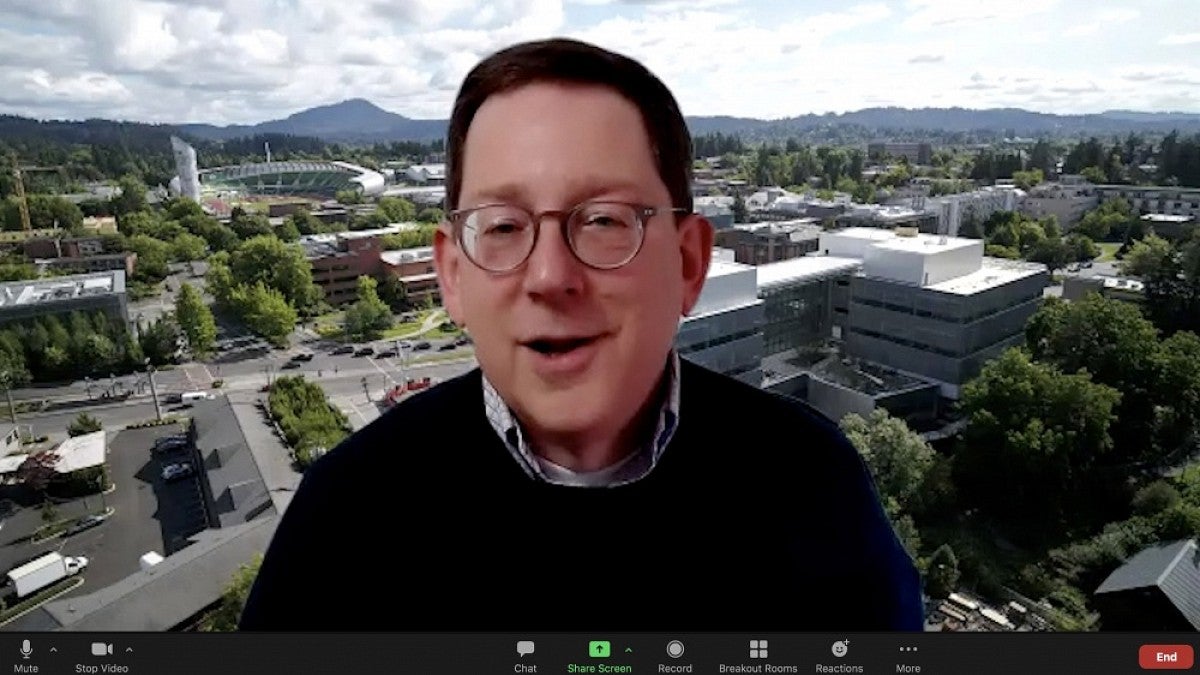By taking just a few virtual steps west of his office in Johnson Hall, University of Oregon President Michael H. Schill is taking on an additional role spring term as he enters a Zoom classroom as a professor for the first time while at the UO.
In a course he is well-qualified to teach, Schill will lead a group of Clark Honors College undergraduates as they explore “Higher Education in the United States: An Introduction to Key Issues and Challenges.” The class will address some of the challenges facing higher education today.
American universities have seen an unprecedented year marked by COVID-19, racial reckoning and the Black Lives Matter movement, divisive politics, and the ever-increasing financial challenges facing higher education. Schill will draw from his professional experience leading the UO through such issues as he examines the structure of higher education and some of the changes that have taken place over the past 75 years.
“The pandemic amplified and accelerated some of the ongoing pressures on higher education,” Schill said. “It also demonstrated the unique contributions public research universities offer to help solve some of our world’s most pressing problems. This course will delve into some of the challenges facing higher education and what that means for students and society.”
One of the primary objectives of the class is to offer students the opportunity to develop skills to discuss, debate and share differing views and do so in a respectful manner.
“When students get out of college, they will need to interact with, work for, do business with and understand people who have different points of view,” Schill said. “Students have the opportunity now to listen to each other and learn about how other people see the world. This is one of the most valuable parts of the college experience.”
Impressed by the determination and innovation of UO faculty members who rapidly shifted to remote and hybrid instruction over the last year, Schill decided that spring term was a good time to return to the classroom. He sought advice from UO colleagues as he prepared his course materials.
“I have always loved teaching,” he said. “It is both exciting and humbling to return to the classroom after many years away, especially in this unique instruction environment. I regularly guest lecture in the Clark Honors College, and the discussion is always lively and invigorating. I am really looking forward to and appreciate the guidance I’ve received from faculty on campus to prepare.”
The course, which will predominantly operate in a discussion-based format, also will explore the financing of higher education and how it has affected tuition and increasingly widened the gap between well-funded “elite” institutions and the rest.
Schill and guest speakers will take on the issue of partisan politics, and students can expect to explore the critiques of universities as “neoliberal” institutions. The range of subjects will include access and affordability, diversity and inclusion, freedom of speech, lagging levels of student achievement and intercollegiate athletics.
Clark Honors College interim Dean Carol Stabile said she is excited about the opportunity Schill is bringing to students.
“We are delighted that President Schill will be teaching a course in the Robert D. Clark Honors College,” she said. “The CHC prides itself on providing seminars that allow students to learn from experts in their fields. Having President Schill teach a course on key issues and challenges in higher education gives our students the opportunity to do just that.”
Schill gives a guest lecture in at least one class an academic year, but this is his first time teaching an entire class at the UO as part of his position as a professor.
Prior to coming to UO in 2016, Schill served as dean at the University of Chicago Law School and dean of the University of California, Los Angeles School of Law. His faculty appointments include tenured positions at New York University and the University of Pennsylvania. Schill graduated with a Bachelor of Arts degree in public policy from Princeton University in 1980 and a doctoral degree in law from Yale Law School in 1984.


